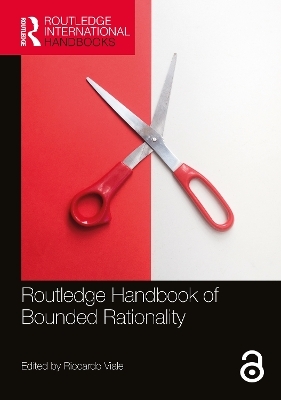
Routledge Handbook of Bounded Rationality
Routledge (Verlag)
978-0-367-56394-3 (ISBN)
Herbert Simon’s renowned theory of bounded rationality is principally interested in cognitive constraints and environmental factors and influences which prevent people from thinking or behaving according to formal rationality. Simon’s theory has been expanded in numerous directions and taken up by various disciplines with an interest in how humans think and behave. This includes philosophy, psychology, neurocognitive sciences, economics, political science, sociology, management, and organization studies.
The Routledge Handbook of Bounded Rationality draws together an international team of leading experts to survey the recent literature and the latest developments in these related fields. The chapters feature entries on key behavioural phenomena, including reasoning, judgement, decision making, uncertainty, risk, heuristics and biases, and fast and frugal heuristics. The text also examines current ideas such as fast and slow thinking, nudge, ecological rationality, evolutionary psychology, embodied cognition, and neurophilosophy. Overall, the volume serves to provide the most complete state-of-the-art collection on bounded rationality available.
This book is essential reading for students and scholars of economics, psychology, neurocognitive sciences, political sciences, and philosophy.
Riccardo Viale is Full Professor of Cognitive Economics and Behavioural Sciences in the Department of Economics at the University of Milano-Bicocca, Italy. He is also the founder and General Secretary of the Herbert Simon Society.
1. Why bounded rationality? 2. What is bounded rationality? PART I Naturalizing bounded rationality 3. Towards a critical naturalism about bounded rationality 4. Bounded rationality: the two cultures 5. Seeking rationality: $500 bills and perceptual obviousness 6. Bounded rationality, distributed cognition, and the computational modeling of complex systems 7. Bounded rationality and problem solving: the interpretative function of thought 8. Simon’s legacies for mathematics educators 9. Bounded knowledge PART II Cognitive misery and mental dualism 10. Bounded rationality, reasoning and dual processing 11. Why humans are cognitive misers and what it means for the Great Rationality Debate 12. Bounded rationality and dual systems 13. Models and rational deductions 14. Patterns of defeasible inference in causal diagnostic judgment 15. Attribute-based choice PART III Occam’s razor: mental monism and ecological rationality 16. Bounded reason in a social world 17. Rationality without optimality: bounded and ecological rationality from a Marrian perspective 18. The winds of change: the Sioux, Silicon Valley, society, and simple heuristics 19. Ecological rationality: bounded rationality in an evolutionary light 20. Mapping heuristics and prospect theory: a study of theory integration 21. Bounded rationality for artificial intelligence 22. Psychopathological irrationality and bounded rationality: why is autism economically rational? PART IV Embodied bounded rationality 23. Embodied bounded rationality 24. Extending the bounded rationality framework: bounded-resource models in biology 25. How rationality is bounded by the brain 26. Building a new rationality from the new cognitive neuroscience PART V Homo Oeconomicus Bundatus 27. Modeling bounded rationality in economic theory: four examples 28. Bounded rationality, satisficing and the evolution of economic thought: diverse concepts 29. Beyond economists’ armchairs: the rise of procedural economics 30. Bounded rationality and expectations in economics 31. Less is more for Bayesians, too 32. Bounded rationality as the cognitive basis for evolutionary economics 33. Beyond "bounded rationality": behaviours and learning in complex evolving worlds PART VI Cognitive organization 34. Bounded rationality and organizational decision making 35. Attention and organizations 36. The bounded rationality of groups and teams 37. Cognitive biases and debiasing in intelligence analysis PART VII Behavioral public policies: nudging and boosting 38. "Better off, as judged by themselves": bounded rationality and nudging 39. An alternative behavioural public policy 40. Against nudging: Simon-inspired behavioral law and economics founded on ecological rationality 41. Bounded rationality in political science 42. Layering, expanding, and visualizing: lessons learned from three "process boosts" in action 43. Cognitive and affective consequences of information and choice overload 44. How much choice is "good enough"?: moderators of information and choice overload
| Erscheinungsdatum | 13.07.2022 |
|---|---|
| Reihe/Serie | Routledge International Handbooks |
| Zusatzinfo | 15 Tables, black and white; 50 Line drawings, black and white; 3 Halftones, black and white; 53 Illustrations, black and white |
| Verlagsort | London |
| Sprache | englisch |
| Maße | 174 x 246 mm |
| Gewicht | 1220 g |
| Themenwelt | Geisteswissenschaften ► Philosophie |
| Geisteswissenschaften ► Psychologie ► Allgemeine Psychologie | |
| Geisteswissenschaften ► Psychologie ► Verhaltenstherapie | |
| ISBN-10 | 0-367-56394-0 / 0367563940 |
| ISBN-13 | 978-0-367-56394-3 / 9780367563943 |
| Zustand | Neuware |
| Informationen gemäß Produktsicherheitsverordnung (GPSR) | |
| Haben Sie eine Frage zum Produkt? |
aus dem Bereich


